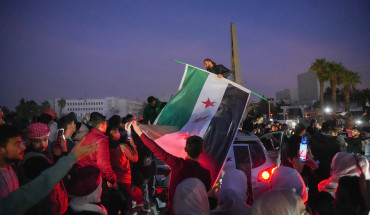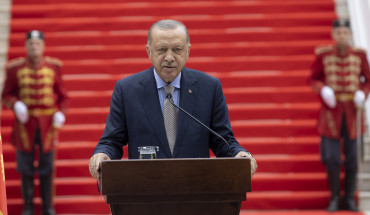This piece is part of the series “All About China”—a journey into the history and diverse culture of China through short articles that shed light on the lasting imprint of China’s past encounters with the Islamic world as well as an exploration of the increasingly vibrant and complex dynamics of contemporary Sino-Middle Eastern relations. Read more ...
On May 21, following eleven days of conflict — the fourth since Hamas took control of the Gaza Strip in 2007 — the Palestinian militant group Hamas and Israel agreed to a cease-fire. A combination of domestic Israeli and Palestinian political dynamics, international failures, and worsening relations between the two sides created the right conditions for bloodshed. Israel carried out hundreds of air and several ground strikes in Gaza, while Palestinian militants fired more than 4,000 rockets at central and southern Israel. The two sides’ actions resulted in a death toll of more than 248 in the Gaza Strip and 12 in Israel, and left more than 8,500 people injured in Palestinian areas.[1]
In recent years, mediation diplomacy has emerged as one of the central pillars of China’s foreign policy objectives and practice, with Beijing deliberately positioning itself as a peacemaker in the Middle East region. This helps China cultivate the image, both domestic and international, interested in bringing about peace and stability in the region. This also gives China a more visible profile and higher stature, enhancing its national and international prestige. Nevertheless, garnering prestige and visibility is not the only driving force behind China’s mediation efforts. Equally important is the growing imperative of gaining power and influence in the broader transformation of the regional balance of power. Beijing uses mediation to further its economic interests and political influence in the countries and areas that the US-China’s top geopolitical rival- had previously dominated.[2]
China-US tensions constitute one of the core elements of a rapidly changing international order. Much of the stress stems from Washington’s effort to curb China’s growing economic and geopolitical influence, and there are a variety of ways this tension is manifested. Thus far, China and the US are locked in geopolitical competition, primarily on the Asian continent. In the coming decades, this evolving great power rivalry will determine the rules, norms, and institutions that govern international relations, as well as the levels of peace and prosperity in world politics. Much of the rising global power competition in the Middle East results from Washington’s disengagement, from decreased troop presence to lower diplomatic engagement.[3]
China has expanded its engagement with the Middle East in recent years such that the region has become the most important for Chinese interests outside the Asia-Pacific. Its rich hydrocarbons, strategic geopolitical location, key international sea lanes, and choke points from the Suez Canal and Bab al-Mandab to the Strait of Hormuz, the Middle East, have been a natural location for China's BRI grand scheme that envisages trans-continental integration. During the past decade, Washington’s waning influence and Beijing’s growing presence in the Middle East have rendered the region a “new battleground” for the rivalry between the two great powers. Hence, China’s stance towards conflict Israeli-Hamas conflict is mainly related to keeping the peace, managing conflict, seeking regional stability, and most coherent response to the rising tension and geopolitical competition between the two great powers.[4]
Given that strategic rivalry increasingly appears to be locked in, the only question by those who hold this perspective is whether China has adopted an increasingly assertive posture and unbalanced diplomatic approach in the Israel-Palestine conflict. As a rising power on the international stage, a major shift in China’s diplomatic approach regional (or global) may prompt it to change course with its overall approach to the Middle East.
Controversy in the UN Security Council
The principle of non-intervention is one of Beijing’s key traditional foreign and security policy guidelines in the Middle East. China's stance towards the region, as to all other regions of the world, has been based on non-intervention in the internal affairs of other sovereign countries.[5] Beijing has gradually developed a prudent and pragmatic case-by-case approach that underlines the extent to which its position and policies on non-intervention, territorial integrity, and sovereignty are conditional. Although the principle of non-interference is a key guideline in China’s diplomatic work and a primary rhetorical tool, there has always been a degree of flexibility in how Beijing conducts its foreign and security policy when it comes to non-intervention.[6]
Specifically, China does not involve itself in the internal affairs of other sovereign countries unless its own national or economic interests (e.g., the safety of its overseas interests, Chinese citizens, and energy supply) are in danger or at risk. Moreover, Beijing has been paying more attention to its international reputation to project a positive image as a reliable great power or key stakeholder in the region. This gives China both a more visible regional profile and enhanced national and international prestige.[7] Beijing has been cautious about committing itself to regional affairs, in large part to avoid being entangled in the tangle of regional conflicts. But with its expanding economic interests and diplomatic presence, China has shown a growing interest in getting involved in Middle East affairs, especially under building the BRI project in the region.
Beijing has long portrayed itself as a strong supporter of the Palestinian cause while also building closer political, economic, and technological ties with Israel. According to China’s Ministry of Commerce, China-Israel trade increased by nearly 19% in 2020 to about $17.5 billion (despite the coronavirus crisis), while commerce with Palestinian territories amounted to a paltry $100 million.[8] Since the outbreak of the war in Gaza, China has sharply criticized Israel and the US in particular than in the past.
Beijing sought to be a leading voice on the Palestine-Israel issue and called Washington to shoulder its responsibilities, portraying the US as a lone voice defending Israel and not letting the UN Security Council (UNSC) condemn Israel’s actions. On May 16, China’s Foreign Minister Wang Yi said that the US was obstructing an attempt by the UNSC to speak with one voice on Israel’s actions in Gaza.[9] Moreover, China’s Foreign Minister stated in the UNSC meeting on the Israel-Palestine situation strongly condemns Israel’s violent acts against civilians but did not mention Hamas’s rocket fire on Israel. He also called on Israel to lift the blockade of Gaza and guarantee the safety and rights of Palestinians in occupied Palestinian territory.[10]
During a program broadcast on CGTN — an official Chinese media outlet — host Zheng Junfeng made anti-Jewish comments and questioned whether Washington support for Israel was genuinely based on shared democratic values, saying “some people believe that US pro-Israeli policy is traceable to the influence of wealthy Jews in the US and the Jewish lobby on US foreign policymakers.” He also noted Washington — Beijing’s top geopolitical rival — used Israel as a ‘beachhead’ in the Middle East and an as a proxy in its campaign to defeat pan-Arabism.[11] The Embassy of Israel in China protested the “blatant antisemitism” expressed during the program, stating: “We have hoped that the times of the ‘Jew’s controlling the world’ conspiracy theories were over, unfortunately, antisemitism has shown its ugly face again.”[12]
Why has China now become so vocal and hostile to Israel’s right to self-defense against the militant Palestinian group that initiated rocket attacks on its capital and citizens? This is an important question, given that Beijing has special interests in Israel, and Jerusalem is a key player in China’s global economic strategy. Since establishing diplomatic ties between the two countries, the relations have warmed and developed rapidly in diverse areas, including diplomacy, trade, investment, construction, educational partnerships, scientific cooperation, and tourism. For Beijing, Israel is a global powerhouse in technology and innovation in cybersecurity, bio-agriculture, and green technology, which is at the heart of its attraction. Geopolitically too, Israel’s location is another potential node in the BRI framework.[13]
Therefore, it seems that the Chinese reactions and comments on Israel’s military operations in Gaza have appeared to target the US. This was more about the rising tension and geopolitical competition between the two great powers, as well as Washington's accusations against China’s treatment of Muslims, than about Israel. On May 12, Western states and human rights groups held a virtual event at the United Nations over Beijing’s treatment (accused of committing genocide) of the Uyghur Muslims and ethnic minorities in the western Xinjiang province.[14]
In response, two days later, Chinese Foreign Ministry spokesperson Hua Chunyin said that the US was ignoring the suffering of Muslims. Washington keeps saying it cares about the human rights of Muslims. Now the Israeli-Palestinian conflict has reoccurred, and many Palestinian Muslims have been affected by the war. They are suffering, but Washington shows indifference to their suffering and has been strongly obstructive on the issue. Meanwhile, it joined with a few of its allies and attempted to organize pointless meetings on Xinjiang-related issues based on lies and political prejudice, a political farce.[15]
Moreover, in a virtual debate of UNSC on Palestine-Israel conflict in the Gaza Strip, China’s Foreign Minister Wang Yi called Washington to “adjust” its position on the Israel-Gaza conflict, claiming that the US was “standing on the opposite side of the international community.”[16] According to the state-run Xinhua News Agency, in a phone conversation with Pakistani Foreign Minister Shah Mahmood Qureshi, Chinese Foreign Minister Wang Yi blamed the US for the UNSC’s lack of action to de-escalate the violence between Israel and Hamas: “Regrettably, the council has so far failed to reach an agreement, with the United States standing on the opposite side of international justice.”[17]
China stresses that its position on the Middle East conflict is based on values, in contrast to that of the US. In Beijing's view, Washington stands ready to fuel the tension rather than taking proactive measures to forestall the Israel-Gaza conflict. According to the Chinese Foreign Ministry website, “The US has been isolated at the UNSC unprecedentedly and is standing on the opposite side of mankind's conscience and morality. China upholds international fairness and justice, while the US only cares about its interests. The US position is dictated by its closeness with relevant sides.”[18]
China’s statements were exploiting the current situation in Israel to isolate Washington in the international community and get back at the Biden administration for recent criticism of Beijing’s Uyghur Muslims' treatment in Xinjiang. China’s statements also are an attempt to undermine regional and international confidence in the US. Beijing has been pushing for greater global influence at the United Nations to challenge US traditional leadership and to flexing its multilateral muscle in other international organizations.
Apart from condemning the Biden administration, Beijing will provide $1 million emergency humanitarian assistance for treating the injured and relocating the homeless and 200,000 doses of COVID-19 vaccines. Beijing pledged another $1 million to the United Nations Relief and Works Agency (UNRWA) for Palestine refugees in the Near East. According to Foreign Ministry spokesperson Zhao Lijian, China will “continue to provide humanitarian support within its capacity and actively participate in the reconstruction of Gaza according to the needs of the Palestinian side.”[19]
Additionally, China, which holds the presidency of the UN Security Council, has tried several times -together with other nations- to reduce the tensions between Israel and Hamas. However, this effort has failed due to opposition from the US. On May 13, China expressed a “high degree of concern” over deadly clashes between Israel and Hamas and urged the UNSC to de-escalate tensions and implement a two-state solution. The next day, the UNSC held another emergency meeting after China, Norway and Tunisia urged the Council to reconvene despite resistance from Washington. Before that, the US had also refrained from adopting a Security Council presidential statement on the Palestine-Israel issue.[20] The eventual meeting, held on May 16, resulted in a political deadlock, prompting China to urge the US to stop “obstructing” the Council from taking action on the conflict and supporting its efforts to ease tensions and find a political resolution.[21]
China appears keen to position itself as an alternative peace broker, capitalizing on the failures or unwillingness of the Biden administration to resolve the disputes in the Middle East. China’s attacks on Washington at the UN were part of its efforts to position itself as a corrective partner to US mediation efforts in the Middle East. In recent years, Beijing has floated several peace initiatives to achieve security and stability in the region. China’s mediation diplomacy activism in Middle East affairs is occurring amid surging expectations among regional powers, especially when the US’ gradual retreat from the region. Nevertheless, China’s aspirations for a leadership role and an alternative mediator in the Israel-Palestinian conflict is likely to be constrained due to its lack of substantial influence and mediating experience, and the US predominant in this issue. At best, it could play a supporting role in efforts led by the US, and its influence in the Middle East conflicts remains somewhat limited.
Conclusion
In the Operation “Guardian of the Walls” in Gaza, China has identified a geopolitical opportunity to strengthen its national interests (especially its Xinjiang policy and positioning itself as a peacemaker) in an age of rising tension and geopolitical competition between the two great powers. Beijing has used the current crisis in Gaza to distract the international debate about its treatment of Uyghur Muslims in Xinjiang. Israel, unwillingly, was integrated by China into the rivalry between the two great powers to ruin Washington's image and thus to damage its position in the international community. To be sure, although “one swallow doesn’t make a summer,” the Middle East has become a “new battleground” region for the rivalry between the two great powers. The public debate surrounding Operation “Guardian of the Walls” in Gaza has vividly illustrated this phenomenon.
[1] “Israel and Hamas Begin Cease-Fire in Gaza Conflict,” The New York Times, May 21, 2021, https://www.nytimes.com/live/2021/05/20/world/israel-palestine-gaza.
[2] Mordechai Chaziza, “China’s Mediation Efforts in the Middle East and North Africa: Constructive Conflict Management,” Strategic Analysis 42, 1 (2018): 29-41.
[3] Joel Wuthnow, “Chinese Perspectives on the Belt Road Initiative: Strategic Rationales, Risks, and Implications,” Center for the Study of Chinese Military Affairs Institute for National Strategic Studies China Strategic Perspectives, No. 12, October 2017, https://inss.ndu.edu/Portals/68/Documents/stratperspective/china/ChinaPerspectives-12.pdf.
[4] “The Belt and Road Initiative: China-Middle East Cooperation in an Age of Geopolitical Turbulence,” Brookings Doha Center, December 16, 2019, https://www.brookings.edu/events/the-belt-and-road-initiative-china-middle-east-cooperation-in-an-age-of-geopolitical-turbulence/.
[5] Yitzhak Shichor, “Fundamentally Unacceptable yet Occasionally Unavoidable: China’s Options on External Interference in the Middle East,” China Report 49, 1 (2013): 25-41.
[6] Chen Zheng, “China Debates the Non-Interference Principle,” The Chinese Journal of International Politics 9, 9 (2013): 349-374.
[7] Mordechai Chaziza, “China’s Economic Diplomacy Approach in the Middle East Conflicts,” China Report 55, 1 (2019): 24-39.
[8] Greer Fay Cashman, “Rivlin receives credentials from new ambassadors from China, Japan,” The Jerusalem Post, April 22, 2021, https://www.jpost.com/israel-news/rivlin-receives-credentials-from-new-ambassadors-from-china-japan-665886.
[9] Seth J. Frantzman, “Why has China emerged as leading critic of Israel over Gaza? - analysis,” The Jerusalem Post, May 20, 2021, https://www.jpost.com/arab-israeli-conflict/why-has-china-emerged-as-leading-critic-of-israel-over-gaza-analysis-668654/.
[10] “Wang Yi chairs UN Security Council meeting on Israel-Palestine situation,” CGTN, May 17, 2021, https://news.cgtn.com/news/2021-05-16/China-to-chair-UNSC-meeting-on-Israel-Palestine-situation-10jpmLFujF6/index.html.
[11] Lahav Harkov, “Chinese media: US supports Israel because of wealthy Jews,” The Jerusalem Post, May 19, 2021, https://www.jpost.com/diaspora/antisemitism/chinese-media-us-supports-israel-because-of-wealthy-jews-668513.
[12] “Israel accuses Chinese state TV of ‘blatant antisemitism,’” The Washington Post, May 19, 2021, https://www.washingtonpost.com/world/israel-accuses-chinese-state-tv-of-blatant-anti-semitism/2021/05/19/528bcace-b85b-11eb-bc4a-62849cf6cca9_story.html.
[13] Zhiqun Zhu, “China--Israel Relations: Past, Present and Prospect,” East Asian Policy 11, 4 (2019): 37-45.
[14] Michelle Nichols, “U.S., UK, Germany clash with China at U.N. over Xinjiang,” Reuters, May 12, 2021, https://www.reuters.com/world/us-vows-keep-speaking-out-until-china-stops-genocide-2021-05-12/.
[15] “China slams U.S. for thwarting UN meetings on Palestine-Israel issue,” Xinhua, May 14, 2021, http://www.xinhuanet.com/english/2021-05/14/c_139946206.htm.
[16] “Chinese FM urges US to 'adjust’ stance on Israel-Palestine issue,” Daily Sabah, May 16, 2021, https://www.dailysabah.com/world/mid-east/chinese-fm-urges-us-to-adjust-stance-on-israel-palestine-issue.
[17] “Chinese FM expounds on China's position on Palestinian-Israeli conflict,” Xinhua, May 15, 2021, http://www.xinhuanet.com/english/2021-05/16/c_139948339.htm.
[18] “Foreign Ministry Spokesperson Zhao Lijian’s Regular Press Conference on May 18, 2021,” Ministry of Foreign Affairs, the People's Republic of China, May 18, 2021, https://www.fmprc.gov.cn/mfa_eng/xwfw_665399/s2510_665401/t1876623.shtml.
[19] “China to provide 1 mln U.S. dollars to Palestine as humanitarian aid,” CGTN, May 21, 2021, https://news.cgtn.com/news/2021-05-21/China-to-provide-humanitarian-aid-to-Palestinian-government-10rmnVSKqu4/index.html.
[20] “China slams U.S. for thwarting UN meetings on Palestine-Israel issue,” Xinhua, May 14, 2021, http://www.xinhuanet.com/english/2021-05/14/c_139946206.htm.
[21] Sarah Zheng and Rachel Zhang, “China offers to host Israeli-Palestinian peace talks,” South China Morning Post, May 17, 2021, https://www.scmp.com/news/china/diplomacy/article/3133734/china-offers-host-israeli-palestinian-peace-talks.
The Middle East Institute (MEI) is an independent, non-partisan, non-for-profit, educational organization. It does not engage in advocacy and its scholars’ opinions are their own. MEI welcomes financial donations, but retains sole editorial control over its work and its publications reflect only the authors’ views. For a listing of MEI donors, please click here.












